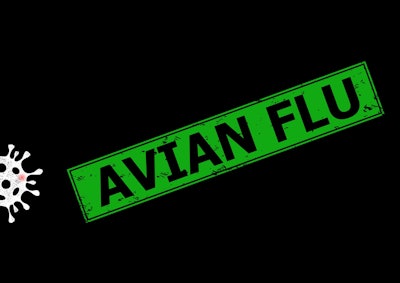
Already this year, nine of Europe's countries have confirmed highly pathogenic avian influenza (HPAI) outbreaks in commercial poultry. Despite this development, official data points to a dramatic reduction in outbreaks in this population last year compared with 2022.
While the battle to control HPAI in Europe was far from won in 2023, Europe saw fewer HPAI outbreaks in poultry and captive birds than in the previous year. Total reported outbreaks in wild birds, however, were higher last year than in 2022. This is according to the latest update of the Animal Disease Information System by the European Commission (EC). It covers the animal disease situation in European Union (EU) member states and neighboring countries.
Among poultry flocks, the total number of outbreaks across the continent was 521, recorded in 24 countries. These totals include Turkiye (Turkey) and the French overseas territory of Réunion, which are not located in Europe. Countries registering the most outbreaks in this category were France (158) and Hungary (148).
For comparison, 25 of the region’s states recorded a total of 2,322 outbreaks on poultry farms in 2022.
Covering non-commercial poultry, zoos, and similar premises, the EC’s “captive birds” category totaled 99 outbreaks recorded by 15 countries in 2023. The previous year, the corresponding figures were 314 and 21, respectively.
In contrast, the number of cases in wild bird populations reported to the EC increased to 3,559 in 2023 from 3,245 the previous year. These outbreaks occurred in 30 European countries in 2023 — down from 33 the previous year.
Nine nations confirm new farm outbreaks
As of January 14, the veterinary agencies of nine European states had registered with the EC’s System the first HPAI outbreaks in poultry of 2024.
Of the total of 33, 13 had occurred in Moldova, five in Hungary, and four in Germany. Meanwhile, Belgium, Bulgaria, France, Poland, Slovakia, and Sweden had each confirmed between one and three outbreaks in this population.
HPAI outbreaks in France, Germany, Poland, Sweden
In France, first HPAI cases of the 2023-2024 season were confirmed at the end of November. According to the agriculture ministry, the outbreak total has reached nine (as of January 12). The presence of the H5N1 HPAI virus was confirmed most recently in a second duck flock and the first turkey farm, both in Vendée — a department in the western region of Pays de la Loire.
At the Vendée turkey farm, 21,650 birds were set to be culled to prevent the further spread of the virus, reported France Bleu.
So far in 2024, four Polish poultry flocks have confirmed HPAI outbreaks linked to the H5N1 virus serotype.
According to Poland’s chief veterinary office, these have directly impacted a total of around 102,000 commercial poultry. Affected have been two flocks of meat turkeys, and one each of breeding and meat ducks in three provinces.
Meanwhile, Germany’s national veterinary reference laboratory, Friedrich-Loeffler Institute (FLI) has reported that the New Year has brought no let-up in HPAI.
In 2023, there were 65 outbreaks on the country’s farms, nine in zoos, and 1,104 in wild birds. In December alone, outbreaks were confirmed on 13 poultry farms. FLI noted that, for the year to October, the virus was what it described as a “seabird-adapted genotype,” which had since been replaced by new variants.
As of January 12, HPAI had affected six poultry flocks and 14 wild birds in Germany, according to FLI. Among these were further outbreaks in the northern states of Schleswig-Holstein and Mecklenburg-West Pomerania, as well as the first recent cases in Bavaria. This outbreak involved a turkey flock of around 20,000, and was the first in this southeastern state following a four-month hiatus.
Following an absence of six months, the H5N1 HPAI virus has been detected again in a poultry flock in Sweden.
Affected was a farm in the southern county of Skåne with almost 48,000 broiler breeders. According to the official notification to the World Organisation for Animal Health (WOAH), more than 3,000 of the birds died, and the rest have been destroyed.
France makes progress on vaccination
So far, more than 12.4 million ducks have been vaccinated against HPAI, reports the French agriculture ministry.
Starting in October of last year, administration of the vaccine has been mandatory to commercial ducks on the French mainland as a means of protecting this highly susceptible group from the virus.
As of January 8, around half of the vaccinations had been applied to the birds in Pays de la Loire, and almost three million in Nouvelle Aquitaine — two regions in the west of the country — and 1.5 million in neighboring Occitania. Only in the Île-de-France region around Paris have no vaccines been given.
Captive bird outbreaks in five European states
So far this year, the animal health agencies of Austria, the Czech Republic (Czechia), Germany, Moldova, and Ukraine have registered H5N1 HPAI infections in backyard poultry to WOAH.
Over the past 10 days, the Czech authority has confirmed eight outbreaks to WOAH, while each of the other nations has reported one affected flock.
Widespread HPAI cases in wild birds
As of January 14, 15 European countries had already registered HPAI outbreaks in their respective wild bird populations to the EC’s animal disease system.
Of the total of 76 outbreaks, Germany accounted for 22, Denmark for 11, and Romania for 10.
View our continuing coverage of the global avian influenza situation.

















